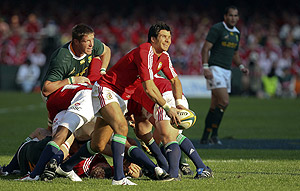
British Lions' Mike Phillips, right, clears the ball as South Africa's Bakkies Botha, left, looks on during their international rugby union match at King's Park, Durban, South Africa, Saturday, June 20, 2009. AP Images
SARU was fined 10,000 pounds, John Smit 1,000 pounds, and the other Springboks were fined 200 pounds – all slaps on the wrist for highly-paid professional players – for bringing rugby into disrepute by wearing protest armbands in a Test against the British and Irish Lions.
The protest, ‘Justice 4 Bakkies’ (4, after Botha’s jersey number), was against a ruling by an IRB panel that gave the Springbok second-rower two weeks suspension for an illegal charge that dislocated the shoulder of the Lions prop, Adam Jones.
The IRB had argued to the committee hearing – Sir John Hansen (a former NZ high Court judge), John Eales, and Guillermo Tragant – the case that each Springboks player and the coaching staff should be fined 10,000 pounds, SARU up to 250,000 pounds, and that the players and the team’s management be suspended from the 2011 Rugby World Cup tournament (with the sanction to be suspended depending on good behaviour).
After the committee entered its findings and sanctions, which many rugby people will feel are too light, the IRB said it would consider an appeal. The committee has specifically asked the IRB not to do this.
The committee is also adamant that if it had not rejected a code of conduct charge on a legal technicality, it would have been inclined to go along with the level of punishment suggested by the IRB.
The committee conceded that there had been a significant breach of the code of conduct, but legal technicalities forced its hand on the nature of its findings and, therefore, its punishments.
The full document of the committee’s finding (over 20 pages dense legal reasoning, in the main) can be found on the IRB website. I passed contracts with about a 52 mark ages ago, so I found this technical stuff virtually incomprehensible.
But the import of it is that SARU, the Springboks, and the team’s management, were saved by legal technicalities which, as I say, I can’t explain.
There are nuggets of information in the findings, though, that indicate that SARU was obstructive and hostile to the entire process.
The committee mentions right at the beginning that SARU was represented by “no fewer than five players.” There is a certain sting in the ‘no fewer’ phrase, and also the comment that the written material extended to “two over-filled Easlight folders.”
There is the complaint, too, that SARU tried to make the matter an investigation of the laws relating to Botha’s suspension and whether it had been consistently and appropriately applied. This line of argument, the committee insisted, avoided the real issue, which was the breach of IRB regulations involved with the protest.
Peter de Villiers, the Springboks coach, tried to have his evidence taken in Afrikaans, even though his English is good. The interpreter provided by SARU was “inadequate,” and SARU’s senior counsel had to do the translating.
SARU made the argument that the committee had no jurisdiction to hear the charges.
This argument was rejected.
SARU was criticised for giving their blessing to the protest without taking into account the consequences flowing from it. Smit conceded that if he had been told of these consequences, he would not have encouraged his team to make their protest in the way they did.
There was much argument about the composition of the IRB committee that made the ruling against Botha and which rejected his appeal. The committee found SARU’s argument’s unconvincing on this matter.
The committee was adamant that, because technicalities prevented it from making findings along the lines suggested by the IRB, that does not prevent it from making this strong statement: “On our view of the matter the individuals have committed acts of misconduct. The playing arena is no place for protest, even if it is limited, as claimed here, with a law of the game and its interpretaiton. However, in our view the matter goes much further. We consider the evidence suggesting that thiswas merely a protest against the law of the game is disingenuous in the extreme.”
When all the legal paraphernalia is stripped away from this comment, SARU, the Springboks and the team’s management stand exposed as acting as recklessly as Botha did when he charged into that fateful maul, and that the committee considered this behaviour serious misconduct.
The committee also suggested a certain hypocrisy on the part of SARU and the Springboks: “Outside of the hearing itself, and noticeably even then not by all witnesses, there has been no formal apology, acknowledgement, contrition or clarification from either the players or the SARU themselves.”
The final comment of the committee speaks for itself: “We are conscious that the IRB may well have power to lay charges under the Regulations we have referred to earlier. We would hope such a course is not followed … We have also made it abundantly clear that, but for legal difficulties … the named individuals would have faced serious sanctions …”
In summary, SARU, the Springboks and the team management were as quilty as sin. They got a lucky legal technicality break and avoided real justice being handed out to them.





























































































